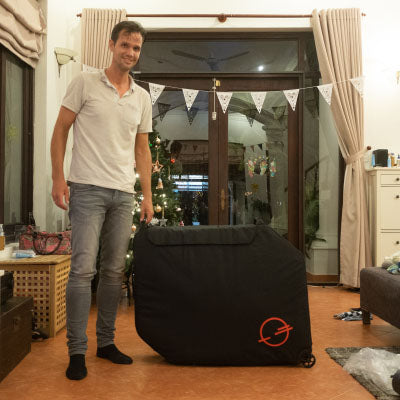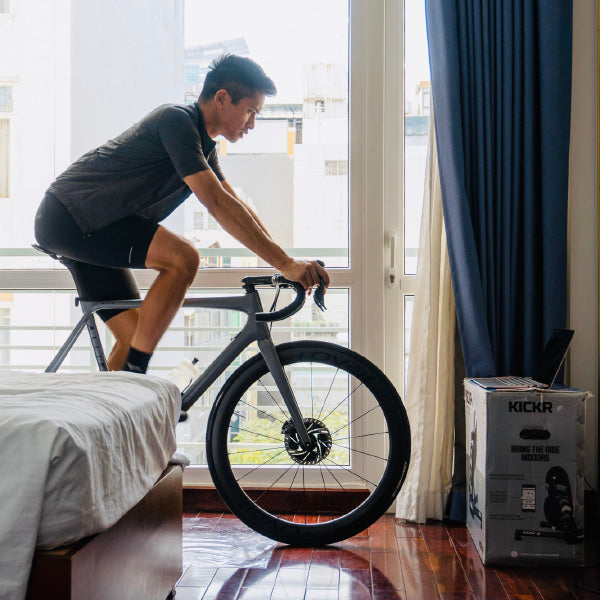One of the benefits of traveling with the Transfer Case is packing your bike in its smallest possible footprint. While the Transfer Case is a little bigger than the common 62 linear inch requirement (length + width + height, the case measures 74-78”), it might be close enough that the airline check-in staff won't even notice. Show up to the baggage check-in counter, strike a friendly conversation with the staff, and they might let it pass without a fee.

Other times, the airline will ask what’s inside. Do you say it’s a bike? Do you say it’s something else? Should you say it’s a bike?
Since the Transfer Case has been flying, customers have been sharing their success stories at evading fees time and time again. Below, I’ve listed the guidelines of some major airlines with some experiences of actual Transfer Case customers. With this guide, I aim to show you the differences between various airline policies so you'll know what to look for in selecting an airline for your next adventure. The Transfer Case can't evade all fees, but knowing the policy of your airline, you can at least understand why.
Alaska Airlines

What they say: Bicycles are “Subject to our standard checked baggage fees and waivers.”
Alaska is great to fly with as they make an exception to sporting equipment and count them as normal checked baggage. Since they have a separate $100 oversized fee, it's important to mention that you DO have a bike to take advantage of their sports equipment exemption.
O.G. Post supporter, Sean, has this to say about AK: “You pay for the bag ahead of time - $30. Usually they ask you to take it to oversized or sometimes they take it for you. Super smooth. No issues.”
American Airlines
What they say: Standard checked bag fees apply to bags up to 50lbs.
American famously removed their extra fee for bikes in 2019 which will hopefully start a trend for major carriers to follow. As long as your bike case is under 50lbs and 126 linear inches, you'll be charged for standard checked bags which varies depending on your destination.
Delta Air Lines

What they say: "A first, second or third checked bag fee according to the fare rules associated with their booking and/or SkyMiles Medallion status.”
Delta is another airline that has eliminated the $150 specialty sports bag fee and now you pay for it like a regular checked bag. Delta is the only airline on this page that, interestingly, has RFID tracking on their luggage tags that allow you to see the location of your luggage as it travels.

Long time Transfer Case tester and constant traveler, Sky, has flown with Delta for most of his work trips. He says traveling with his bike on Delta has been relatively stress-free. Except once, this summer, when the airline lost his Transfer Case en route to CDG (but was able to find and return it to him a few days later). While this might happen with any airline with any piece of luggage, Delta’s RFID tracking might’ve helped Sky realize that his bike wasn’t coming with him to the hotel that day.
Jetblue Airways

What they say: Domestic and International, the fee for a bicycle is $100 if the case is over 62 dimensional inches. The maximum size for a bicycle case is 80 inches in overall dimension (length + width + height). Crucially, the Transfer Case is under 80 inches. It is unclear on their website how bike cases over 80 inches are charged.
Jetblue is an airline, like Alaska mentioned above, that distinguishes bikes with a lower fee versus general oversized bags. The fee for bringing a bike case under 80 inches is $100. But it's $150, their oversized fee, for general luggage between 62-80 inches. When you fly Jetblue and if the airline counter agent asks upon check-in, then DO say it's a bike inside.
American and Jetblue announced a partnership in early 2021 which means that some flights marketed as Jetblue could actually be operated by American. If your Jetblue itinerary includes a codeshare flight with American, you might check-in with the more bike friendly American. Make sure to confirm ahead of booking.
Southwest Airlines
What they say: Bicycles “will be accepted as Checked Baggage for a $75 each way charge.”
Southwest is still charging for bikes, but at least the $75 charge is less than other airlines. However, with convenient routes to locations on the West Coast, might it be worth the money? See below what some cyclists that tried to “sneak it through” experienced with Southwest.

Fanny and her partner shared this report with us about flying with the Transfer Case on Southwest to Hawaii in late 2020. Two out of three flights meant $300 savings on Southwest baggage fees for the two of them! “We made it 2 out of 3 flights without being discovered or having to pay anything! On our way home from Kona, Southwest attendants already knew it was a bike for one thing and they actually took out a tape measure to measure each side to check if it met their specs!”
Jerome in 2021 said about flying with his Transfer Case on Southwest, Denver to Ontario: “They didn’t even ask if it was a bike.”
In one instance when the luck of the Transfer Case didn’t show up, Bob shared his report to Unbound Gravel in 2021: “I flew Southwest. They recognized that this was a bike immediately, so I had to fork over $75 each way for the bike. Southwest was the only airline with direct flights from Oakland to KC, so that played a major role in airline choice. There were about 8 other bikes on my flight.”
United Airlines

What they used to say: Bikes under 50lbs and over 62 linear inches will be subject to an oversized charge which is "a flat service charge of $150 each way for travel between the U.S., Canada, Puerto Rico and the U.S. Virgin Islands. A service charge of $200 each way applies for all other travel."
What they now say: As of September 2021, the Sports Equipment policy page no longer states the quote above and instead says: "Oversized bag fees do not apply to checked bicycles. Standard checked baggage fees as well as overweight service charges still apply."
Ah, United. The one that led me to design the Transfer Case. It used to be the most expensive in terms of bike fees, but it appears that United discreetly updated their terms and are no longer charging the $150/$200 fee for taking your bike. This is great news for constant fliers of United.
As always, it wouldn't hurt to confirm with customer service before your United flight. But, since there has been no official press release on this yet, I'll leave the comments of United fliers with the Transfer Case below:
Terrence shared with us his experience in early 2021, showing that experiences with bikes may vary even at the same airport on the same day: “They did ask me [what it was] at Newark airport. Following the lead from some comment I read elsewhere, I told them it was therapy equipment and tools, which is true. No charge. The friends I was traveling with (who checked in separately) were both charged over $200. Not sure how United calculated that. It seemed like an error.
Flying out of Moab, I assumed they would just KNOW, especially as I was traveling with people with full size bike cases. Not only did they not ask me, they didn't charge three of us. Only one of my friends was charged. Strange and it felt like an outlier experience.”
Lee also shared her experience with United in summer 2021: “I flew United First Class, not something I usually do, but I got a good price. I was NOT charged for the Transfer Case! I kept the weight under 50 lbs. I was asked if there was a bicycle in the case and I sort of said yes, or more specifically that there was recreational equipment in it. The checker looked at it and simply tagged it and sent it on it’s way. I’m not sure if that is because the case was thought to be small enough, or because I was flying First Class, but hopefully the former.”
Takeaways
- Alaska, American, and Delta are currently the best major US carriers for flying with a bike. United just updated their policy and are also now allowing bikes (in non-oversized cases) without fees.
- On other airlines, your experience may vary (on unknown variables) depending on airport or day you fly. One time you might get charged, another time you won't.
- Know when to say it’s a bike, or when you might want to say not a bike.
As we've seen, sometimes you get away from a baggage fee, other times you won't. It might feel demoralizing to suck up a fee, but we have another way to look at it:
Our view on traveling with your bike focuses more on the holistic experience than simply avoiding fees. See: Why travel with the Transfer Case. Remember, your trip will involve taking a vehicle or public transit to arrive at your accommodation, possibly lifting your luggage up flights of stairs, maybe traveling with companions, and so on. Which is when the compact size helps tremendously. As for fees, chances are you'll still save a lot versus traveling with a bigger case.
This guide will be updated over time to feature more carriers. If you’ve traveled recently on an airline with your bike, I’d love to know how it went. Leave it in the comments below or send an email. Safe travels.
-Marc Mendoza
Founder @ Post
Last updated September 2021
Note that the guidelines listed are for “standard/economy class” passengers and the limitations may be different for other passenger classes. And as a disclaimer: The author, contributors of this article, or anyone else connected with Post Carry Co., in any way whatsoever, can not make any guarantees about the completeness, reliability, and accuracy of this information. Any action you take upon the information on this website is strictly at your own risk, and we will not be liable for any airline fees, losses, or damages in connection with the use of the information on this website. I encourage you to review the policies directly as they are subject to change.





